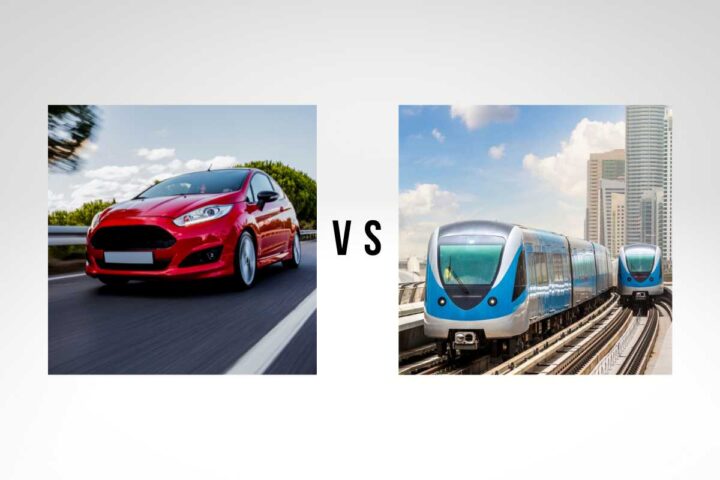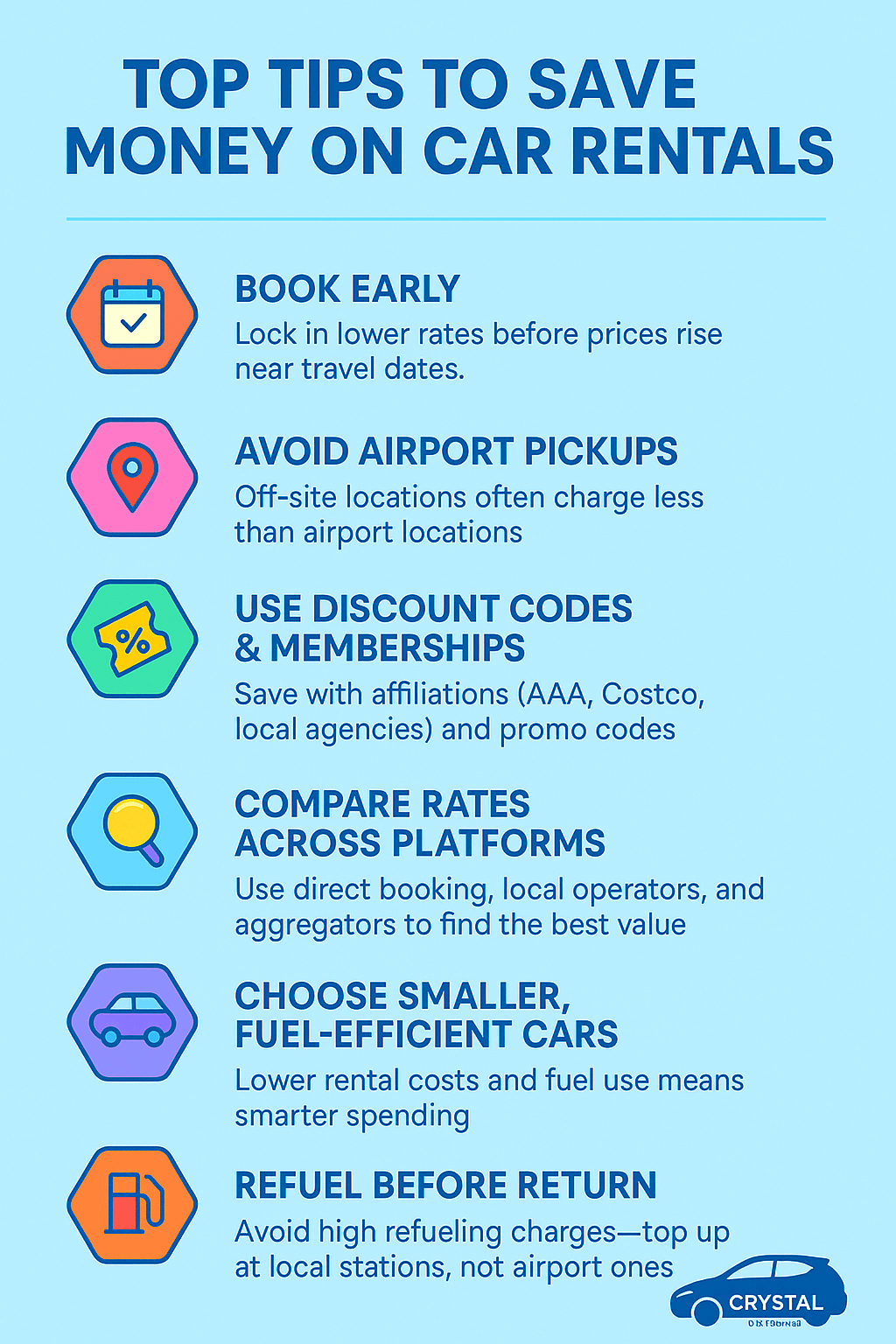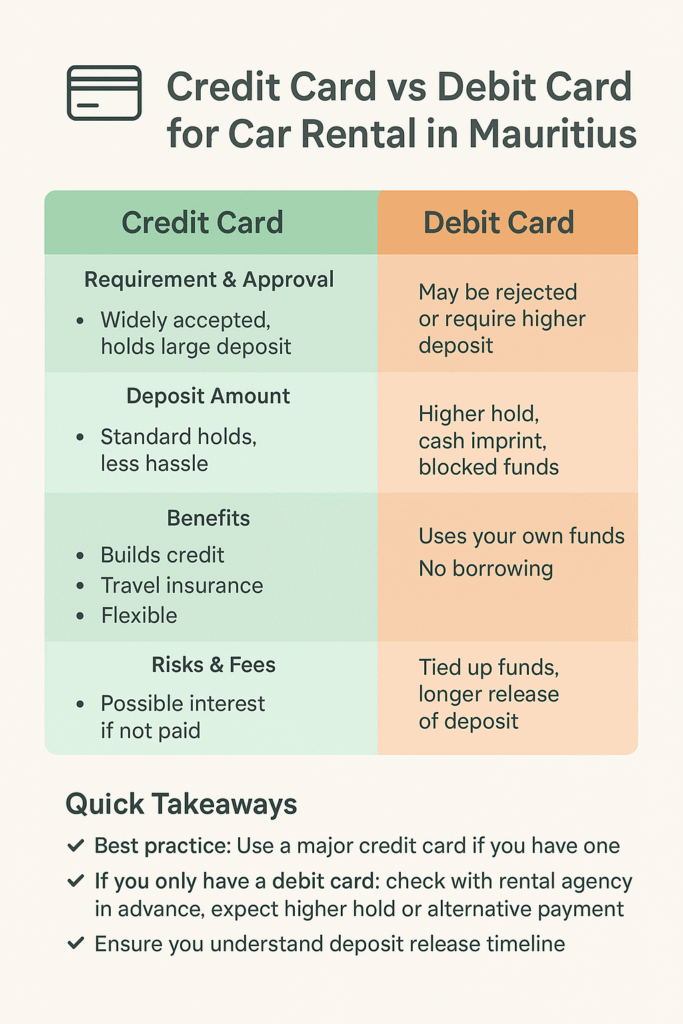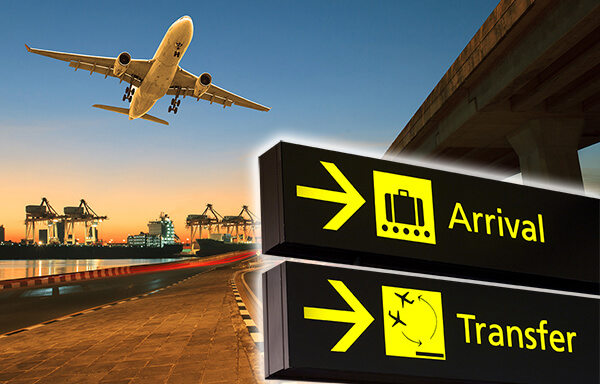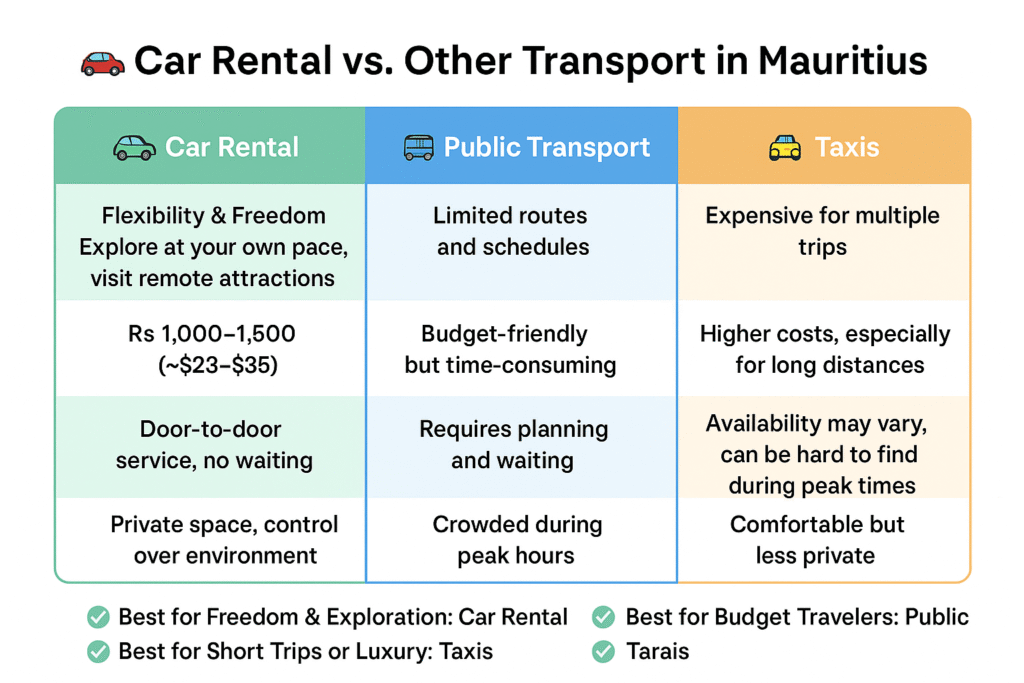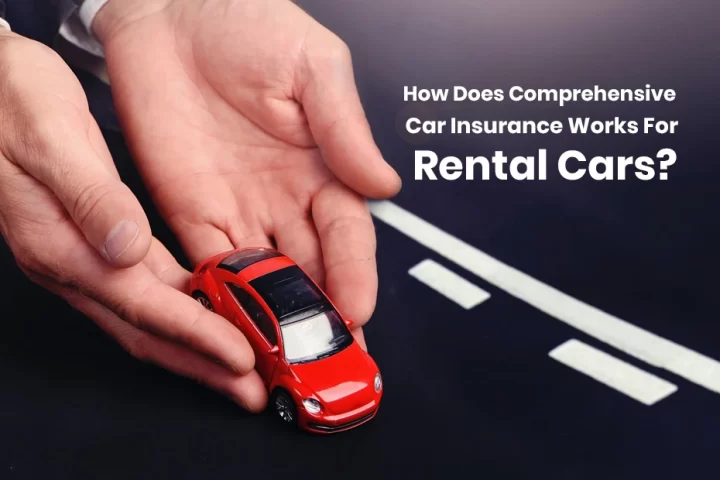When planning a dream vacation to Mauritius, how you choose to explore the island can make all the difference. I've discovered that renting a car offers unparalleled freedom and convenience, far outshining the experience you'd get with public transport. This isn't just about comfort; it's about making the most of your precious holiday time.
Navigating Mauritius by car means you're not tied to bus schedules or limited to the routes taxis are willing to take. Instead, imagine the breeze in your hair as you drive along the coast, stopping at hidden beaches and quaint villages at your own pace. It's the kind of spontaneity and adventure that public transport simply can't match.
In this piece, I'll dive into why renting a car is your best bet for an unforgettable Mauritius holiday. From the freedom to explore off-the-beaten-path locations to the ease of planning your day, the benefits are clear. Let's get started on why you should consider this option for your next island getaway.
The Freedom of Exploring at Your Own Pace with car rental
Exploring Mauritius by renting a car offers an unparalleled sense of freedom compared to the limitations of public transport. My experience validates the immense value of this flexibility, which allows travelers to immerse themselves fully in the island's beauty at their own pace. This section delves into why renting a car is advantageous for those wishing to explore Mauritius without the constraints typically encountered with public transportation.
No Timetable Restrictions
One of the most liberating aspects of renting a car in Mauritius is the ability to travel without adhering to a fixed schedule. Public transport, while efficient in its own right, operates on strict timetables, which can significantly limit how much of the island you're able to see in a day. I've found that the ability to start the day whenever I choose, be it for an early sunrise at the beach or a late start after a leisurely breakfast, greatly enhances the vacation experience. This flexibility extends to spending as much or as little time as I'd like at each location, free from the worry of missing the last bus or train back to the hotel. It's this type of freedom that transforms a holiday from good to unforgettable, allowing for spontaneous detours and discoveries that are often the highlights of a trip.
Accessing Remote Locations
Mauritius is known for its stunning, secluded spots often situated away from the main tourist trails. Accessing these remote locations can be a challenge with public transport, which typically caters to more popular and densely populated areas. With a rented car, I've ventured off the beaten path to discover hidden beaches, quaint villages, and breathtaking landscapes that I would have otherwise missed. These moments of serenity, away from the crowds, wouldn't have been possible without the independence a personal vehicle provides. Moreover, having a car means there's room to bring along any necessary gear, be it for hiking, snorkeling, or picnicking, enabling a full day of adventures without the constraints of carrying everything by hand. This level of accessibility ensures every day is maximized to its fullest potential, creating a rich tapestry of experiences that public transport simply cannot match.
The freedom to explore Mauritius at one's own pace is a key factor in choosing to rent a car for the holiday of a lifetime. From no timetable restrictions to accessing the most remote and enchanting parts of the island, the benefits are clear. Renting a car not only offers convenience but also opens up a world of possibilities that enrich the travel experience in ways public transport cannot.
Cost-Effectiveness for Groups and Families
Exploring the cost benefits of renting a car in Mauritius becomes even more pronounced when it comes to groups and families. The dynamics of shared costs and the inconvenience of buying multiple tickets for public transport highlight two significant advantages: sharing rental expenses and avoiding the hassle of purchasing individual tickets for each journey.
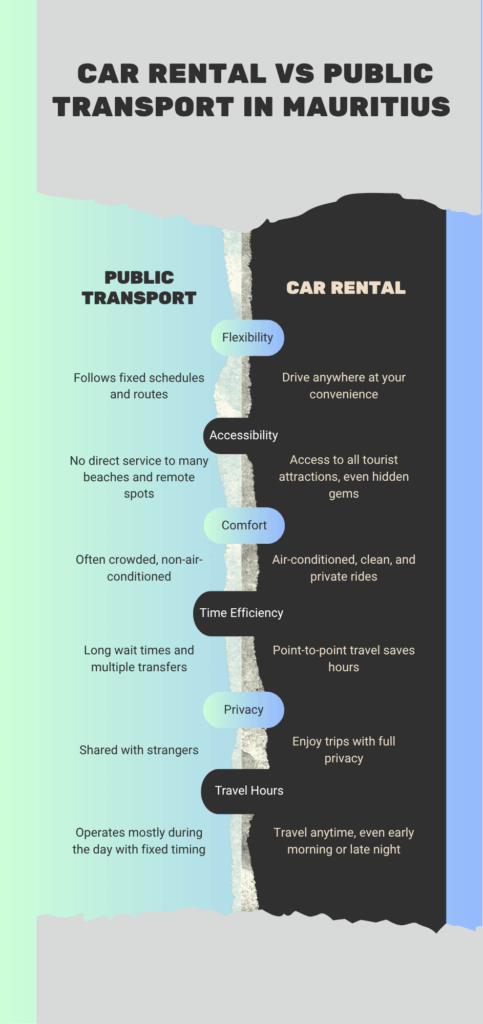
Sharing Rental Expenses
Renting a car in Mauritius offers an economical advantage for groups and families. Splitting the cost of a rental car among members turns out to be significantly cheaper than individual fares on public transport, especially for larger groups. For instance, the daily rental fee for a comfortable, spacious vehicle capable of accommodating a family of four or a group of friends is often less than the cumulative cost of multiple bus or taxi fares needed to visit various attractions across the island. This shared expense approach not only reduces the financial burden on each person but also enhances the holiday experience by traveling together in comfort.
Avoiding Multiple Ticket Purchases with car rental
Another aspect where renting a car clearly beats public transport is the avoidance of repeated ticket purchases. For families or groups planning to visit multiple sites in a day, the logistics of buying individual tickets for each leg of the journey can be daunting and time-consuming. Public transport in Mauritius, while reliable, requires passengers to purchase tickets for each bus or train ride, which can quickly add up in cost and complexity, particularly for those unfamiliar with the system. In contrast, a rental car eliminates this issue, offering unlimited access to any destination on the island with a single upfront payment. This not only streamlines the travel process but also allows for greater flexibility in itinerary adjustments without the worry of additional costs.
For groups and families looking to explore Mauritius, renting a car presents a cost-effective and convenient alternative to navigating the often complicated and more costly public transport system. By sharing rental expenses and eliminating the hassle of multiple ticket purchases, travelers can enjoy a seamless, enjoyable, and economically smart holiday experience.
Comfort and Convenience Factors
In my exploration of why renting a car beats public transport for your Mauritius holiday, let's delve into the aspects of comfort and convenience that significantly contribute to a superior travel experience. Renting a car not only elevates your journey with tailored travel conditions but also ensures that your privacy and space are uncompromised.
Climate-Controlled Travel
One of the prime advantages of opting for a rental car in Mauritius is the guarantee of climate-controlled travel. Mauritius is known for its tropical climate, with temperatures fluctuating between warm and hot throughout the year. By renting a car, I've found that controlling the internal environment is a breeze, no matter the weather conditions outside. Whether it's turning up the air conditioning to combat the midday heat or adjusting the heater during cooler evenings, the ability to modify your travel climate enhances your comfort multifold. This level of personalized climate control is something public transport cannot offer, making rental cars a preferable choice for many.
Luggage Space and Privacy
When it comes to traveling, especially in a scenic yet expansive island like Mauritius, luggage space and privacy become crucial factors. Renting a car offers ample room for not just the passengers but also for their luggage, sporting equipment, or any shopping items picked up along the way. My experience has shown that this eliminates the stress of cramped spaces and the struggle to keep personal belongings safe and organized - a common issue on public transport.
Moreover, the privacy that comes with renting a car is unparalleled. It allows for personal conversations, the choice of music on the stereo, and the freedom to take breaks or detours whenever desired, without concern for fellow passengers’ preferences or schedules. This privacy aspect significantly enhances the overall holiday experience, making car rental in Mauritius a highly favored option for travelers seeking both comfort and convenience.
Cultural Immersion and Flexibility
In the heart of a Mauritius holiday, cultural immersion and flexibility rank high for an unforgettable experience. Renting a car not only elevates this adventure but also seamlessly integrates it into the journey, allowing me to dive deep into the island’s vibrant culture and tailor each day to my spontaneity and curiosity.
Meeting Locals off the Beaten Path
Exploring Mauritius by car, I've found, offers unparalleled opportunities to meet locals in their authentic settings, far removed from the well-trodden tourist spots. Small villages and hidden gems that public transport often bypasses become accessible, showcasing the real heartbeat of the island. Engaging with the local community, trying traditional street food like Dholl Puri from a roadside stall, or simply having a chat at a quaint village shop enriches the travel experience manifold. These encounters allow for a genuine understanding of the Mauritian way of life, adding depth and color to my holiday narrative.
Adapting Plans on the Fly
One of the highlights of having a rented car in Mauritius is the liberating ability to adapt plans on the fly. If I hear about a can't-miss local event or spot an intriguing trailhead on the side of the road, there’s nothing stopping me from exploring it right then and there. This flexibility is a game-changer, setting the stage for serendipitous discoveries and adventures. Whether it's deciding to chase the sunset at a newly recommended beach or opting to spend a few extra hours exploring the vibrant streets of Port Louis, a rented car puts me in the driver’s seat of my holiday, literally and figuratively. The freedom to change course as I please, guided by whims or local recommendations, ensures that my Mauritius experience is uniquely mine, filled with personal triumphs and treasures.
In essence, renting a car in Mauritius not only amplifies the cultural immersion and flexibility of the holiday but also turns every moment into a potential adventure, making it the superior choice over public transport.
Safety and Reliability Considerations
Exploring the aspects that make renting a car in Mauritius a preferable choice over public transport, I delve into the crucial factors of safety and reliability. These components are significant for travelers seeking peace of mind during their holiday.
Dependable Transportation
Renting a car ensures that I have dependable transportation at my disposal. Unlike public transport, where schedules can be erratic and delays common, a rental car is ready to go whenever I am. This reliability is especially important in Mauritius, where some attractions are located in areas that might be difficult to reach through public transport. Having a car means I'm not reliant on the punctuality or availability of buses or taxis, making my travel plans seamless and stress-free. Additionally, rental agencies in Mauritius typically offer 24/7 assistance, ensuring that any issues with the vehicle are promptly addressed, further enhancing the reliability of this mode of transportation.
Reduced Exposure to Crowds
In the context of safety, particularly relevant in today's world, renting a car significantly reduces my exposure to crowded spaces. Public transportation, by nature, involves traveling with many people in confined areas, which can be a concern for those cautious about health and safety. By choosing a rental car, I minimize my contact with large groups, allowing for a safer and more comfortable holiday experience. This aspect is not only beneficial health-wise but also offers a sense of privacy and personal space that greatly enhances the overall vacation experience in Mauritius.
Together, the dependable nature of having a personal vehicle and the reduced exposure to crowds justify the choice of renting a car in Mauritius for safety and reliability considerations. These factors, combined with the flexibility and freedom previously discussed, paint a comprehensive picture of why renting a car surpasses public transport for an unforgettable holiday experience on the island.
Conclusion Opting to rent a car for your Mauritius holiday clearly outweighs the limitations of relying on public transport. The unmatched freedom to explore at your own pace, combined with the cost savings for groups and families, makes it a no-brainer. It's not just about the convenience; it's about crafting a personalized adventure that immerses you in the local culture far beyond what scheduled routes offer. Safety and reliability seal the deal, ensuring peace of mind throughout your journey. For a truly unforgettable experience, embracing the flexibility and independence of a rental car is the way to go

